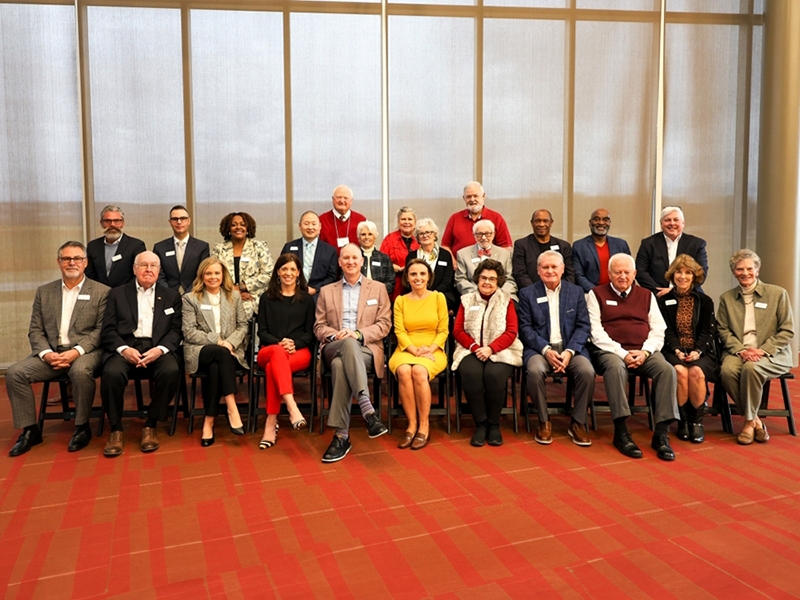
Students from multiple College of Education and Health Professions degree programs evoked laughter and tears in equal measure last week as they shared poignant stories illustrating the impact their hands-on learning experiences have on them and the people they serve in education and health spaces.
One student shared about a child who learned to love reading after she sparked his interest with just the right book. Another persuaded an older adult to participate in her various therapies with just a little nail polish, lipstick and encouraging words as inspiration.
The 10 students — who are preparing to become nurses, teachers, counselors, occupational therapists, athletic trainers, exercise scientists, education policymakers, speech-language pathologists and public health specialists — were among the presenters at the college's spring Dean's Executive Advisory Board meeting.
"This is why we do what we do," Dean Kate Mamiseishvili told the crowd following the student spotlights. "These students make us want to show up and do better. They give purpose to what we do. We want to create even more transformative experiential learning opportunities for our students and engage them in the work that makes a difference and improves people's quality of life."
One of the cross-cutting themes of the college's WE CARE — Wellness and Education Commitment to Arkansas Excellence — strategic plan is integrating health and education. The 41 members of the dean's advisory board are college alumni, community partners and other stakeholders from both fields.
Health and education are interconnected, a theme the college explored at the day-long meeting titled "Better than the Sum of its Parts: Synergies between Education and Health." The college is focused on enhancing its impactful and innovative work by identifying and optimizing strengths.
"The overarching goal of the day centered around what the college can do differently or better to integrate education and health further so that together, we can continue to be better than the sum of its parts," Mamiseishvili said. "I'm so grateful to the advisory board members for their commitment and care in helping us find new ways to enhance the health and education of Arkansans and those outside the state. This is the strength of the College of Education of Health Professions."
The March 8 meeting marked the start of the second year of Mamiseishvili's advisory board, which links the community and the college, providing input about the needs of people across the state, region and nation. Judd Semingson, the chief executive officer at Community Clinic, is the board's new chair, and John L Colbert, retired superintendent of Fayetteville Public Schools, is chair-elect. Ashlie Hilbun, senior vice president and chief strategy officer at Arkansas Children's Hospital, was the chair in the board's first year of service.
Mamiseishvili shared updates with the group about achievements within the college, including the many grants that will allow for research or programs that help people in Arkansas thrive. She also shared about new projects forthcoming in the college, including a new alumni mentoring program.
The day also included a panel discussion about projects and programs that integrate education and health in unique, innovative ways. College faculty shared about projects that enhance students' experiences and professional preparation, inform policy decisions and advance research in Arkansas.
There was also plenty of time for some fellowship and fun, including trivia about the college, like how many students are enrolled (6,199) and how many deans have led the college (18).
The meeting concluded with an open discussion for board members to reflect on the interconnectedness between health and education. They weighed in on how to improve the preparation of students so they can better address education and health in their careers and how they see connections between education and health evolving in the future.
The final question to board members was: how can we further integrate education and health, or what synergies do we need to cultivate among our diverse programs so that, together, we continue to be better than the sum of its parts?
Board members shared a wide array of ideas for future consideration and asked faculty questions to learn more about how current college initiatives could be amplified and strengthened.
"What a phenomenal day of discussion and learning together how to serve our students and the state better," Mamiseishvili said. "I can't thank our board members enough for partnering with us to make the college stronger and helping us care for communities in Arkansas and beyond."
About the College of Education and Health Professions: The College of Education and Health Professions' six departments prepare students for a range of careers in education and health. In addition to its longstanding role of preparing educators and educational leaders, the college trains nurses, speech-language pathologists, public health specialists, recreation and sports professionals, counselors, occupational therapists, athletic trainers, and exercise scientists.
Topics
- Education
- Health, Fitness & Wellness
- Academic Affairs
- Student Success
- Faculty and Staff Success
- College of Education and Health Professions
- Department of Curriculum and Instruction
- Department of Health, Human Performance and Recreation
- Eleanor Mann School of Nursing
- Department of Education Reform
- Department of Communication Disorders and Occupational Therapy
- Department of Counseling, Leadership and Research Methods
Contacts
Shannon G. Magsam, director of communications
College of Education and Health Professions
479-575-3138,